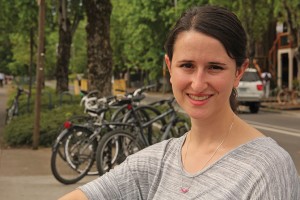 Humanities
Humanities
Indigenous Voices Matter
 A single word from the language of the Warm Springs tribe, translated to English, can become a paragraph.
A single word from the language of the Warm Springs tribe, translated to English, can become a paragraph.
As with many native peoples, this central Oregon tribe has infused place names and other words with rich cultural, historical, and ecological information. When scientists working with these indigenous groups translate their language and experiences into English, they risk losing part of the meaning that the native words convey—that is, even with a paragraph of many words, something essential can be lost.
So says Charlotte Rheingold (above), whose study of language translation in climate-change research was recognized as a standout. Her paper on the topic was chosen among thousands of submissions for presentation earlier this year at the National Conference on Undergraduate Research in Washington state.
Rheingold, who graduated in June, relied heavily on her major in comparative literature for the project. In a class on radical poetry last year, she learned that translation can be much more than simply swapping one word for another—if done meticulously, translation can be a portal through which groups gain a true understanding of one another.
“You can translate something to English and erase some of the cultural context,” Rheingold said, “or you can really work to make the reader learn about the culture. It’s the difference between trying to describe a particular custom by making an analogy to something that isn’t quite right, and just taking the time to explain that custom in its own right.”
The idea took hold of Rheingold, and she didn’t have to wait long to apply it. She was also taking a course in the Clark Honors College on climate and culture in the Americas; for her term paper in that class, Rheingold used what she had learned about translation theory to show how indigenous groups can be either hurt or helped by translations into English.
Among her findings, Rheingold concluded that even well-meaning researchers aren’t doing enough to ensure that indigenous customs and culture aren’t “lost in translation” in the rush to report scientific information. In a study exploring the history of glaciers, she noted, scientists didn’t conceive of the glacier as a sentient and spiritual entity—although native people do. And thus that perspective is omitted from the ensuing discussion about climate solutions.
“Since indigenous groups face some of the most dramatic effects of climate change, they strongly want their voices to be included in the conversation,” Rheingold said. “But in a way that respects their cultural identity.”
—By Matt Cooper


 Twitter
Twitter Facebook
Facebook Forward
Forward